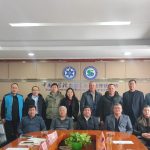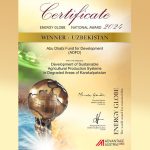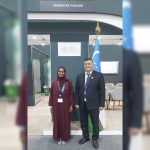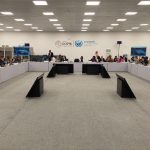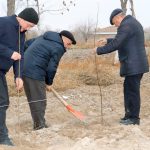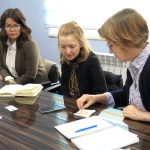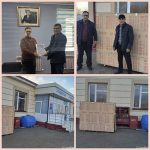One of the main directions of the foreign policy of the Republic of Uzbekistan is the further development of political, trade, economic, investment, transport and communication, cultural and humanitarian ties with the People’s Republic of China. At present, Chinese-Uzbek relations are at the highest stage of development and the Head of our State has clearly set specific tasks for the development of mutually beneficial cooperation between countries. In pursuance of the tasks set, the International Innovation Center of the Aral Sea basin under the President of the Republic of Uzbekistan and the Xinjiang Institute of Ecology and Geography of the Chinese Academy of Sciences (XIEG) have been cooperating for several years and implementing joint environmental projects. On May 9 this year The International Innovation Center hosted a reception of the Delegation of the Chinese Academy of Sciences (CAS) and the Xinjiang Institute of Ecology and Geography at the Chinese Academy of Sciences (XIEG), headed by the Vice-President of the CAS prof. Zhang Tao, accompanied by the Director General of the Bureau of Science and Technology Development of CAS prof. Wen Ya, Deputy Director General of the Bureau of International Cooperation of CAS Wu Yang, Rector of the Institute of Tibetan Plateau Yao Tandong, Director General of XIEG Zhang Yuanming, and professors of research institutes and universities of CAS. During the meeting, the importance of bilateral strategic cooperation between China and Uzbekistan was noted and promising project proposals were presented for the integrated development of the Aral Sea region, including ways to introduce innovative environmental developments and technologies.
- The main purpose of this visit of the delegation is to discuss issues of joint cooperation in the field of science, ecology, and the socio-economic sphere. In particular, the possibilities of implementing joint research projects in the field of adaptation to water scarcity in the Aral Sea region and the creation of desert plantations on the dried seabed were considered. Particular attention was paid to the discussion of measures taken in Uzbekistan to improve the environmental situation in the region, and the guests were acquainted with the reforms carried out by the President and the Government of the Republic of Uzbekistan in the field of ecology, overcoming the consequences of the drying up of the Aral Sea, improving socio-economic indicators in the Aral Sea region, creating green cover on the drained bottom of the sea.
During the visit to Muynak, the delegation was shown the transformations in the Aral Sea region, in particular, the implementation of state programs for planting greenery on the dried bottom of the Aral Sea and the projects being implemented jointly with the PRC at the scientific and production site “Muynak” of the ICIP. Further, the delegation visited the Museum of the History of the Aral Sea and visually assessed the scale of the environmental catastrophe and social consequences associated with the drying up of the Aral Sea. As a result of the meeting, specific tasks were identified, which identified the basic principles and promising areas for further close cooperation between the parties to restore the Aral Sea region.
![]()


